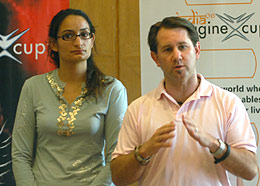REDMOND, Wash., Aug. 7, 2006 – For many students who participate in Microsoft’s Imagine Cup competition, the experience extends beyond the classroom and becomes a launch pad for a career in information technology. In its fourth year, Imagine Cup is a worldwide technology competition designed to provide opportunities for university students to help define the future of technology, software and computing by designing software with real-world applicability.
This week, winning teams from around the world compete in the Worldwide Imagine Cup Finals in India, with this year’s winners being announced at a ceremony on Aug. 11. In India, 72 teams comprised of 181 students representing 42 countries are competing. Those competing in India were chosen from a pool of more than 65,000 students from more than 100 countries. The competition will conclude with a formal flag-passing from India to Korea, which will host the competition in 2007.
If this year’s participants follow in the footsteps of previous competitors, the awards celebration could very well be the beginning of something big.
Tu Nguyen, for example, was a member of the winning team in 2003. Today, he’s vice president of technology with DocCenter, an Omaha, Neb.-based company specializing in design and delivery of content management technologies.
And Styliani Taplidou, along with the other members of the Greek team that took third place in the 2004 Imagine Cup, have raised more than €500,000 (approximately US$630,000) to help transform the team’s “SmartEyes” application into a viable product that will benefit visually impaired people worldwide.
Connecting Disparate Worlds

Joe Wilson (right), Director of Academic Initiatives for Microsoft, and Sheila Gulati, Director of Developer and Platform Evangelism for Microsoft India announce the start of the of the Imagine Cup 2006 competition, in which 181 students from 72 teams representing 42 different countries will participate. Agra, India, August 9, 2006.
When Nguyen entered the Imagine Cup competition, he didn’t have a suit, a PowerPoint presentation or even a vague notion of winning. But, based on the experience of working in his family’s restaurant, the University of Nebraska student had an idea – and it turned out to be a winning one.
“I wasn’t a developer, but I turned to the Microsoft .NET Framework for Web Services because my parents needed a better way for American-born waiters to communicate with the Vietnamese chefs in the kitchen,” says Nguyen, who came to the U.S. from Vietnam 13 years ago with his family. “Having restaurant workers who speak both languages is helpful when the chefs do not speak English, but bilingual workers can be hard to find. Also, I saw mistakes occur in the ordering process.”
To address those challenges, Nguyen developed an application called Hotpad, which facilitates communication between the kitchen and the dining room via PDAs that can converse in both Vietnamese and English.
After winning the Imagine Cup, a local television station profiled Nguyen’s project, and seven other restaurants in Omaha hired him to deploy the application.
Another significant thing happened after Nguyen won the competition: he received funding and other assistance from the Walter Scott Foundation and the Peter Kiewit Institute, which paved the way for the formation of DocCenter. DocCenter currently employs 27, has three core products on the markets, and has exceeded US$1 million in sales and plans to double that this year.
With DocCenter up and running successfully, Nguyen, like any good entrepreneur, is focusing on the future.
“We are very excited about our new product, Electronic Document/Digital Storage Vault, or EDDS Vault, which builds on the knowledge gained from developing the PDA restaurant application and our expertise in designing and delivering online content management solutions,” he says. The EDDS Vault, according to Nguyen, will handle all aspects of converting paper-based documents into electronic data and managing the life cycle of their documents and other content.
A Vision from the Greek Team
At the 2004 Imagine Cup, the Greek team took third place for its “SmartEyes” application, which the team developed to benefit people who are visually impaired. In addition to Taplidou, the team included Dimitrios Bisias, Nikolaos Trichakis and Eleni Korkontzila, all of whom were students at Aristotle University of Thessaloniki.
Taplidou says that the Greek team was inspired to develop its application by the theme of that year’s competition, which was imagining software that makes everyday life easier. “We thought it would be more useful if we could make everyday life easier for people who need it the most, so we addressed people with special needs, and we finally focused on visually impaired people,” Taplidou says.
“SmartEyes” is an orientation-assisting tool based entirely on voice commands. The user introduces a destination and is told directions to reach it. The application also incorporates various methods of public transportation for reaching public buildings and nearby social services, and includes software that enables use of the application via telephone.
After taking third place at the 2004 competition, “SmartEyes” evolved into a pilot research program currently hosted by the Aristotle University of Thessaloniki. It is funded by Microsoft’s Greek subsidiary; Cosmote, a large Greek telecommunications agency; and by Geomatics, which provides digital maps for “SmartEyes.”
Taplidou says that she and the rest of the team are working toward turning “SmartEyes” into a business but that they’re in no hurry to rush through critical development steps. At the moment, “SmartEyes” is a pilot research program hosted by the university. It is expected to be presented at the 71st International Thessaloniki Fair early next month, where the first 150 users will be selected to test it. “Any future plans for making this into a business depend on the impact and impressions the project has on those who test it during the pilot project,” says Taplidou.




